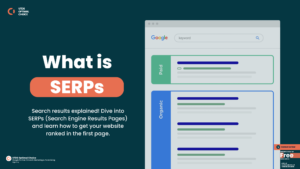Have you ever gotten really frustrated waiting for a website to load on your computer or phone? Website speed has become a critical factor that can make or break your online success. It not only impacts your search engine optimization (SEO) efforts but also directly affects the user experience of your visitors. A slow-loading website can drive potential customers away and hinder your ability to rank well in search engine results pages (SERPs). Check our seo basics for beginners to learn more.
In this article, we’ll explore why website speed is so important and how you can optimize your site for better performance.
How Website Speed Impacts SEO and User Experience
What is Website Speed?
Website speed refers to the amount of time it takes for a web page to fully load and become interactive for users. It is typically measured by three key metrics:
- Page Load Time: This is the time it takes for the entire web page to display on the user’s screen.
- Interactivity: This metric measures how quickly a user can interact with the page by clicking links, buttons, or other interactive elements.
- Visual Stability: This refers to how smoothly the page loads without any unexpected shifts or jumps in content as elements load.
Why Website Speed Matters for SEO
Google has made it clear that website speed is a significant ranking factor in their search algorithm. Faster websites tend to rank higher in search results, while slower sites may get penalized. There are several reasons why website speed is crucial for SEO:
- User Experience: Google prioritises user experience, and slow-loading websites frustrate users, leading to higher bounce rates and shorter session durations.
- Mobile Friendly: With the increasing use of mobile devices, Google places emphasis on mobile site speed, which directly impacts mobile rankings.
- Crawl Budget: Search engines have limited resources to crawl websites, and faster sites allow more pages to be crawled within the allocated budget.
Studies have shown that even a one-second delay in page load time can significantly impact bounce rates, conversions, and overall user satisfaction.
Impact of Website Speed on User Experience
Website speed is not just a ranking factor; it also has a direct impact on the user experience and website traffic. In today’s fast-paced world, users have little patience for slow websites. Some key impacts of website speed on user experience include:
- Bounce Rate: Slow-loading pages often lead to higher bounce rates, as users quickly abandon the site before it fully loads.
- Conversion Rate: Slower websites tend to have lower conversion rates, as users are less likely to make a purchase or complete a desired action if the site is sluggish.
- User Satisfaction: A fast and responsive website creates a positive user experience, leading to increased satisfaction and brand loyalty.
- Mobile Experience: Slow-loading mobile sites can be particularly frustrating for users on-the-go, leading to a poor mobile experience and potential lost customers.
Factors Affecting Website Speed
Several factors can contribute to slow website speed, including:
- Large Image and Video Files: Unoptimised media files can significantly increase page load times, especially on mobile devices.
- Unoptimised Code: Poorly written or unminified code (CSS, JavaScript, HTML) can add unnecessary weight to web pages, slowing them down.
- Server Response Time: The time it takes for a server to respond to a user’s request can impact page load times, especially for dynamic websites.
- Hosting Performance: Using a low-quality or overloaded hosting service can lead to slower website speeds.
- Third-Party Scripts: Scripts from external sources, such as advertising networks or analytics tools, can add additional load times to your pages.
How to Measure Website Speed
To identify and address website speed issues, you’ll need to measure your site’s performance. Several tools are available to help you do this:
- Google PageSpeed Insights: This tool from Google provides an overall speed score for your website and offers specific recommendations for optimization.
- Lighthouse: An open-source tool from Google that audits website performance, accessibility, and more.
- GTmetrix: A comprehensive website speed test tool that analyzes your site’s performance and provides detailed reports.
- Pingdom Tools: A suite of tools that includes a website speed test, transaction monitoring, and synthetic monitoring.
These tools can help you identify specific areas of your website that need optimization and provide guidance on how to improve your site’s speed.
Best Practices to Improve Website Speed
Once you’ve identified the areas for improvement, you can implement various best practices to optimize your website’s speed:
- Image and Video Optimization: Compress and resize media files, use the appropriate file formats, and consider implementing lazy loading or progressive rendering.
- Code Minification: Minify your CSS, JavaScript, and HTML files to remove unnecessary characters and whitespace, reducing file sizes.
- Browser Caching: Leverage browser caching to store static assets (CSS, JavaScript, images) on the user’s device, reducing the need to download them on subsequent visits.
- Content Delivery Network (CDN): Use a CDN to distribute your website’s content from servers closer to the user’s location, reducing latency.
- Server Optimization: Upgrade your hosting plan, optimize your server’s configuration, and consider using a content management system (CMS) with built-in caching mechanisms.
- Minimize Third-Party Scripts: Audit and minimize the use of external scripts, as they can significantly impact page load times.
- Accelerated Mobile Pages (AMP): Implement AMP for faster mobile page loads and improved mobile user experience.
How Can We Help You?
At UTDS Optimal Choice, we understand the importance of website speed for both SEO and user experience. Our team of experienced web developers and SEO professionals can conduct a comprehensive website speed audit, identify areas for improvement, and implement the necessary optimizations to ensure your site loads quickly and efficiently.
Don’t let a slow website hold your business back. Contact us today to schedule a consultation, and let us help you optimize your website’s speed for better search rankings and a superior user experience.

What is SERPs
Search results explained! Dive into SERPs (Search Engine Results Pages) and learn how to get your website ranked in the first page.

How To Set Up Google My Business Profile
Get found by more customers in UK ! Easy steps to create a free Google My Business Profile to show your business on Google Maps & Search.

SEO For Financial Services: Simple Guide
Need more clients? Grow your Financial Services Company in the UK with our complete SEO guide to attract new clients and increase visibility.



